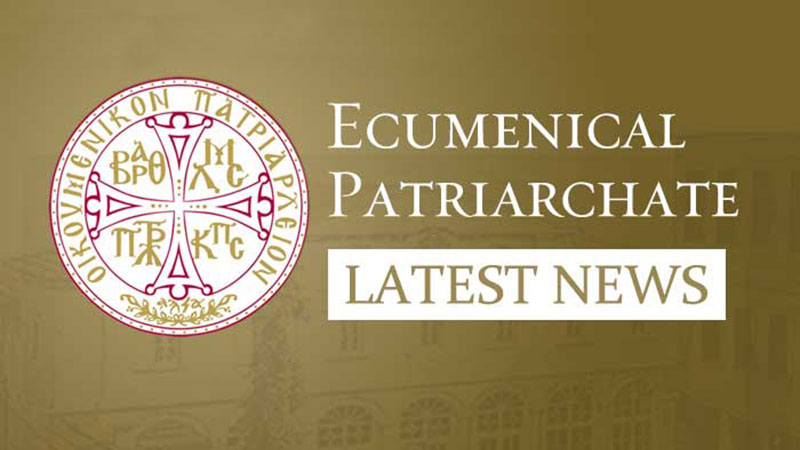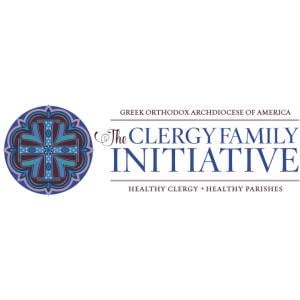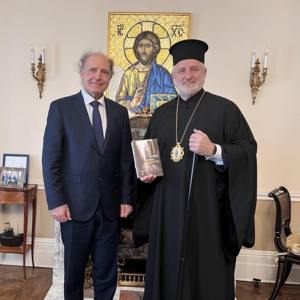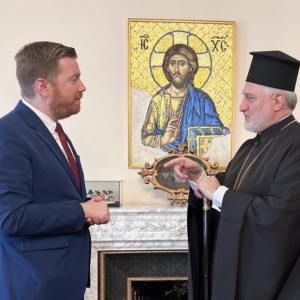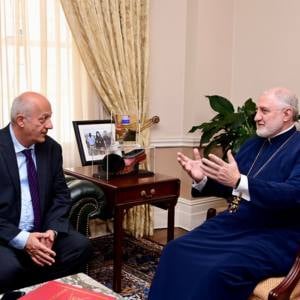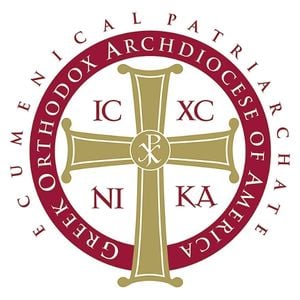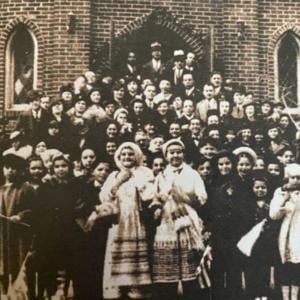Contact: Press Office, Stavros Papagermanos, [email protected]
August 19, 2019
“The fact of the unexpected recent reopening of our schools gives us the right to hope, to be optimistic and to believe that Imbros is not a lost cause forever,” said the Ecumenical Patriarch, who celebrated the Divine Liturgy in the church of his village.
In a moving atmosphere, the Dormition of the Theotokos was celebrated in Imbros, where the Ecumenical Patriarch Bartholomew celebrated the Divine Liturgy in the village of Agios Theodoros.
“I came again ‘to my own city,’ to my homeland, to the Imbros of our fathers and our hearts, who are always waiting for their estranged children to cling to them, to quench their nostalgia for them. And now, to tell them to ‘look,’ that she is reborn, that she is resurrected, that her little children play and shout again, that ‘life goes on.’ To tell them that it is alive and breathing, and it continues,” said the Ecumenical Patriarch, who is from Imbros, in his address to the congregation after the Divine Liturgy.
“Our Imbros is waiting for her estranged children, especially in these days of August, ‘with the glorious summers,’ as the poet (G. Drosinis) would say, to celebrate with the All-Holy Mother, who our much-afflicted island thinks of as ‘more spacious than the heavens,’ the eternal land, the noble, the omniscient, the omnipresent, the one who stands between the Creator and the creation, the one who is ‘divinely glorified,’ the one who, according to Seferis, ‘has in her eyes the mosaic of the sorrow of the Greeks.’ That is why the All-Holy Mother is ours: because she knows about sorrows!
“A few decades ago, here the ‘lights were all off and eyes shut, night had fallen. Desolate,’ to remember the words of Palamas. And Dido Sotiriou said for such occasions: “The rivers are running, not with water, but with the tears in my eyes.”
“But thank God, now we have a homeland again. And why am I saying this? I say this, beginning with what Evi Christoforidou writes in the cute children’s book entitled ‘Adil Has a Homeland.’ There she says: ‘Your home is where your smile can bloom. I have a home because I have hope.’
“Well, thank God again, here in our Imbros, today our smile can and does bloom again. So I said we now have a homeland again. No, of course, it was a beautiful lady. All of it. With thousands of homogeneous poppies. With its festivals. With its sunny days. With its youth. And with its poverty. Honorable and decent poverty, but with a rich heart, with self-sufficiency, with austerity, with the ascetic ethos of Orthodoxy. Even without a port then. And no asphalt on the roads -- no roads at all. No electricity. No water in our homes. Without many cars. Walking back and forth for two years in Panagia to the Central School. That’s how we older ones grew up. But we were happy. Let us stay that way, as it was then, and never let the storm come and the hurricane that uprooted us. But, unfortunately, at a certain time they did come. Look at the culprits.
“Today, when dawn is upon us again, we honor those few who had the courage to stay, who went into debt to keep their bones still in their homeland. They lived and died without support or hope.
“Now we have hope and we have a home. And we visit her nostalgically in August, which is the month of the Imbrians, the month of the returnees, the month of rebirth, of hope, of sorrowful memory.”
His All-Holiness continued:
“The bittersweet walk in the streets of our villages becomes a full-blown smile of joy and satisfaction when we look at our renovated schools, here in our village and in Agridia, the village of the pious Imbrians. Who would have told us that after half a century of silence and interruption, unjustly imposed, the ‘best of the Imbros islands’ would once again have the opportunity to teach literature to their children and ensure their cultural continuity now and forever.
“I say ‘and forever’ because the fact of the unexpected recent reopening of our schools gives us the right to hope, to be optimistic and to believe that Imbros is not a lost cause forever. Indeed, the weak among men are nevertheless strong with God, for we have as mediator the one who gave birth to Him, the one who wrapped Him in swaddling clothes, the one who embraced Him, the Infant, the one who nursed Him, the one who suckled Him, the one who is presented as Queen at His right hand, ‘clothed in a golden garment,’ according to the prophecy of the Prophet Nathan, the son of David. She is the Mediatrix because indeed, ‘the prayer of the Mother is very powerful, by the grace of the Master.’”
Metropolitan Chrysostomos of Myra, who comes from the same place, concelebrated with the Ecumenical Patriarch; present were the Consul General of Greece in Istanbul, Ms. Georgia Sultanopoulou, along with the Consul Ms. Danae Vassilakis, the Ambassador of Greece to Vietnam, Mr. Ioannis Raptakis, the President of the Imbrian Association of Athens, Mr. Stylianos Poulados, and members of the Board, the President of the Imbrian Association of Macedonia-Thrace, Pavlos Stamatidis, and members of the Board, the President of ESIEA, Maria Antoniadou, a large number of residents of Agios Theodoros and other villages, as well as Imbrians who live in Greece and other countries.
Immediately afterwards, His All-Holiness honored his compatriot, Kyriakos Koutsomallis, the Director of the “Basil and Eliza Goulandris” Foundation and the Museum of Modern Art, with the offikion of Archon Referendarios of the Great Church of Christ. In his address, he noted, among other things:
“The area of art and artistic creation, despite rumors to the contrary, is of immediate interest to the Church. The Orthodox Faith has been and continues to be an endless source of inspiration and creativity. It is well known that the so-called ‘modern art’ aided in the discovery and appreciation of the Byzantine art of iconography. The Church cultivated many forms of art, while Orthodox monasteries were regarded as blessed centers of hagiography, wood-carving, miniatures and other forms of art, and as blessed custodians of valuable works of art, manuscripts, icons, sacred vessels, vestments, etc., the core of the cultural heritage of our people.
“Beloved Archon,
“All along your way to France and Greece, you did not forget our Imbros. You come often and draw upon the gifts of life, rejuvenate. And you, like all of us, are proud to be born of the ‘playground.’ We all owe a great deal to our way of life, which our ancestors passed on to us. Thanks to the values of this tradition, we have survived and progressed, and our future is also linked to them. These principles, faith in God, love for man, respect for creation, hard work and simplicity of life, gratitude for the gift of life, hospitality, trust in the power of the Good, must be cultivated and applied in our lives. What the family, the school and the Church were pleased to do was to incarnate them, keep them alive against the pervasive barren self-centeredness of our time, the ‘inflated ego’ and the ‘isolated individual.’”
In his response, the young Archon thanked the Ecumenical Patriarch for the great honor he had bestowed upon himself and his family, and referred to the course he had followed all these years, from the time of his youth in Imbros and later at the Theological School of Halki, up to his studies in Paris and his service in the field of Art.
In the afternoon, His All-Holiness visited the Museum dedicated to his life and ministry, and remained in his village. He then went to the cemetery of Agios Theodoros, and then visited the village of Glyki.

